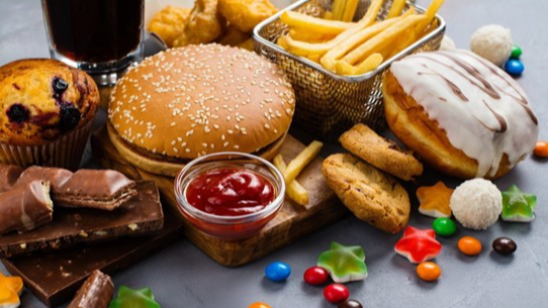Eat Carbs, Get Shredded? Do This First.

Carbs or Abs? Yes, I'll have Both.
Athletes have a love-hate relationship with carbohydrates. Carbs are an excellent (and come on, delicious) source of energy. But too much of the glucose that carbs convert into has consequences. These range from ending abs quicker than Vanilla Ice’s music career to causing full blown diabetes.
However, thanks to a clever bit of chemistry that can be performed in any kitchen, carbs are staying firmly on the menu.
University of Surrey researchers have determined the negative effects of carbohydrates can be vastly reduced simply by cooking rice, pasta and other carbs and cooling them down for a few hours. Leftovers never sounded so good.
The authors of the study found refrigerating pasta before eating it lead to a significant reduction in the uptake of glucose. When the pasta was cooled and reheated, the researchers found the impact of the carbs was reduced even further – by a whopping 50%.
Blood sugar increase from the cooled-and-re-heated pasta group was half that of those who ate the pasta immediately after cooking it, even though the participants in both groups ate the same amount.
A similar study presented at the Congress of the American Chemical Society replicated the above results, using rice in place of pasta. Sound a bit ridiculous? Sure. Is the science sound though? Absolutely.

Why it Works
The carbohydrates in rice, potatoes, wheat pasta and bread consist of twenty percent amylopectin and eighty percent amylose. Glucose (sugar) from amylopectin is absorbed faster than glucose from amylose.
After cooking, the hydrogen atoms of the glucose molecules in amylopectin and amylose connect to form bridges. The body finds it more difficult to cut these chains into separate glucose units, preventing blood sugar levels from spiking as they typically would. To put it simply, these new carbohydrate chains resist being processed and stored as body fat.
After cooling and re-heating a second time, some of the carbs are further converted into resistant starch. Resistant starch is a carbohydrate that isn't fully broken down and absorbed. It has several benefits for humans, including better digestion, reduced appetite, and better insulin sensitivity -- vital for driving calories toward muscle building and away from fat storage. Resistant starch also improves gut health, feeds healthy bacteria, and even enhances nutrient absorption from food.
Meal Prep and Chill
Harness the power of chemistry and make carbs work for you. All it takes is four easy steps:
- Cook your pasta or rice
- Throw it in the fridge overnight
- Microwave it until it’s piping hot
- Laugh maniacally as you enjoy (okay, laughing's optional)

Eat Carbs, Make Gains
Carbs tell the body to grow – in all sorts of ways, good and bad. Through the heat/cool/heat method described above, we’ve reduced the way carbs signal fat cells to grow. Now our attention turns to harnessing that signaling effect and re-directing it to tell muscles to grow.
Muscle cells have receptor sites that sit around, like hungry mouths, needing to be fed. These are sometimes described as being like locks in need of keys, with the receptors waiting for chemical compounds that “fit” and activate growth and repair processes.
Carbohydrates, as they’re digested, trigger the release of compounds that fit those receptors and signal muscles to grow. However, there is a problem with the lock/key way of looking at the process, and it’s the reason we compared muscle cell receptors to “hungry mouths”.
Under normal circumstances, not all the receptor sites are open. Many remain shut, like a picky kid shaking his head at a fork-plane of food. Potential muscle gains fly right on by, lost, or worse, to pair up with similar receptors located in fat cells.
The key to truly impressive natural muscle gains lies in being able to force these millions of tiny receptor “mouths” wide open at exactly the right times to be fed.
There are two strategies to accomplish this task -- known as nutrient partitioning -- and the best approach is to use both methods.

1. Lift to Eat
Train hard, heavy, and with intensity, and refuel quickly after. There’s no arguing with the science: Aggressively using muscle to overcome resistance (ie, weights) lights up muscle receptor sites like it’s the Fourth of July.
This effect is especially powerful in the first 30-60 minutes after training. In fact, it’s the mechanism of action behind the famed “Anabolic Window”, where everyone sprints off to drink a protein shake as fast as possible after training.
Nutrient timing is crucial to driving fuel to where you want it (muscle) and away from where you don’t (fat cells). When those receptor sites in muscle are crying out to be fed after a brutal workout, they soak up nutrition like a sponge, leaving fat cells to starve.

2. (Smart) Supplementation
This needs to be said up front: Supplements alone don’t build great physiques – dedication to proper training and nutrition does.
The supplement industry is plagued by bad science, “sponsored” research, ridiculous hype, under-dosed key ingredients and many other shenanigans.
However, it would be a mistake to write supplements off entirely. There are ingredients with safe, scientifically-proven benefits to increase strength, muscle endurance and growth, fat loss, and more (we didn’t cite 23 different, unsponsored studies at the foot of this article for fun – good science matters).
In this case, to enable muscles to absorb as much nutrition as possible and reach their full potential, four ingredients stand out. These range from the common to the exotic (including one you probably already have in your kitchen and never thought of as a supplement at all).
Cinnamon
You can sprinkle this one right on top of those carbs we tricked out earlier. Cinnamomum cassia, as it’s known formally, contains oligomeric pro-anthocyanidins -- substances that stimulate muscle cells to absorb more glucose from the blood stream.
Before anyone objects that something often followed by ‘rolls’ can do anything good for physique goals, consider: in a recent French study, subjects taking 460mg of cinnamon daily reduced their body fat percentage while adding 2 pounds of lean body mass. And they weren’t training.
Cyanocobalamin and Pantothenic Acid
When used at clinical dosages, both ingredients play vital roles in converting nutrition into usable, muscle-fueling energy. In addition to a host of other benefits, Pantothenic Acid naturally elevates testosterone levels, which in turn boosts protein synthesis and partitions nutrients toward muscle building.
Supplement carefully: these ingredients are almost universally under-dosed. Look for a product containing 30mcg of Cyanocobalamin and 80 to 100mg of Calcium-D-Pantothenate, the most effective form of Pantothenic Acid.
Octacosanol
While more exotic, Octacosanol is a proven muscle building powerhouse. Octacosanol accelerates muscle building directly, increases muscular storage of glycogen (carbs stored within muscle directly as fuel), and amplifies the Krebs Cycle to breakdown fat for fuel during training
While all the above are solid reasons to supplement with Octacosanol, the last is critical for physique goals. Octacosanol doesn’t just improve muscle building; it boosts fat burning at exactly the right time to protect the gains you’ve already made from being broken down during hard workouts. It is both anabolic and anti-catabolic, which is unusual to say the least.
Octacosanol has a wealth of additional benefits for strength and physique goals beyond the scope of this article, but suffice to say, it’s powerful stuff.
In fact, a peer-reviewed study found participants supplementing with Octacosanol over a six-week period gained 25% more lean muscle mass than participants who did not receive Octacosanol.
Our pre-training product, UNTAPPED, includes the maximum clinical dosages of Cyanocobalamin, Calcium-D-Pantothenate, and Octacosanol, stacked with a powerful blend of the most effective, well-researched ingredients for increasing strength, focus, energy, and muscle building.
It's a radically different approach to pre-training supplementation that goes beyond the temporary, buzzy energy traditional pre-workout products provide.
Of course, don’t take our word for it. Read media reviews from GymFlow100, HD-Body, Supplement Police, and other leading blogs, Facebook user feedback, peer-reviewed studies, and third-party-verified product reviews from people currently training with UNTAPPED.
The Bottom Line
- Carbs aren’t the enemy; they’re a tool for achieving strength, physique, and athletic goals.
- Used properly (heating/cooling/reheating), at the right time (after lifting or other intense muscular exercise), and with smart supplementation, carbohydrates are practically performance enhancing. Don’t eliminate them.
- If you’re training high volume or trying to put on mass, you simply won’t get there without consuming carbs. And now that you have a few tricks up your sleeve, you can get shredded while you do it.
Recommended: What is UNTAPPED™?
Recommended: Partial Reps for Massive Arms? Study: 20%+ Greater Gains
References (23)
Also in News

How Processed Foods Sabotage Gains (and Your Knees!)
New research shows junk food impacts muscle quality in ways nobody saw coming - with pictures *inside* the muscles to prove it. 👀 Trust, you need to see this...

Can Lifting Weights Reverse Aging?
Science is finding strength training fights aging all the way down to your DNA, and it may just be the closest thing to a real-life fountain of youth. Here's what you need to know.




